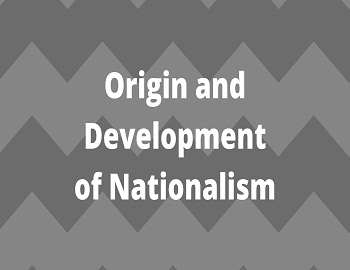Origin and Development of Nationalism:
It is not clear when nationalism first made its appearance in world history. However, it is evident that nationalism is a recent phenomenon. As Prof. Organski writes, “Nationalism in the modern sense, did not exist at the time of Romans or the ancient Greeks. It was not present in medieval times. Some trace of nationalistic feeling can possibly be found at the very beginning of modern times when the nations state was first becoming an important form of political organization”.
However, it must be pointed out here that some small groups were imbued with a feeling of nationalism long before.
Professor Zananiecki notes “We find that at a certain stage in the evolution of every national culture, society includes only a relatively small number of intellectuals, who are united by the belief that they belong to a community with a common culture different from other cultures and who cooperate in perpetuating and developing that culture”.
At this stage, people were not aware of the common bonds. With the passage of time nationalism spread by means of propaganda and education.
Professor Kohn contends that nationalism originated in Western Europe in the seventeenth and eighteenth centuries, but that it did not become a general European movement until the nineteenth.
In the early nineteenth century, the English, the French, the Greeks, the Irish, and the Russians were each united by common bonds.
After World War II, nationalism spread to Africa also.
If nationalism is decreasing anywhere is a debatable question. This position was made clear by Barbara Ward in a scholarly book, “Five Ideas That Changed The World”.
Barbara Ward, although contending that nationalism is “still the strongest, most persuasive force of our day”, also argues, “there are, however, a few signs that it is beginning to spend itself a little and beginning to give ground to other concepts. And it is significant that these changes are to be remarked in Western Europe, the first home of modern, industrialized, democratic nationalism and also the arena where the worst consequences of this type of nationalism have been worked out. Europe’s ghastly feuds, which we might well call the tribal wars of modern man, have led to disgust with the extreme forms of nationalism. A new and absorbing struggle is in progress between the old concept of France, of Germany, of Italy, of Holland, and of Belgium as separate, sovereign, absolutely autonomous states and a new concept of supernational communities, a new sense that must work together if they are to survive, Behind the talk of political and economic union in Europe today there is in many hearts a sense of disillusion, a revulsion from the consequence of perfervid nationalism. The chance that this is the sign of a new trend, of a new seminal idea, is made all the more plausible by the pace of its emergence in Western Europe where national communities have been longest in being and have worked the longest havoc with each other”.









Comments (No)